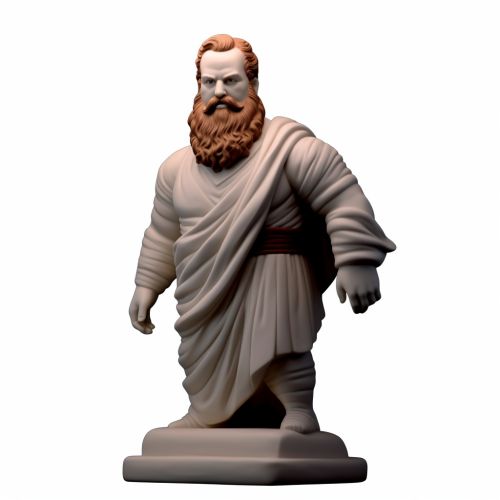Sophocles
Early Life and Family
Sophocles was born around 497/6 BC in Colonus Hippius (now part of modern-day Athens), a small village just outside the city-state of Athens, Greece. His father, Sophilus, was a wealthy member of the rural deme (small community) of Colonus Hippius, and he was a man of status and influence. Sophocles was provided with the best traditional aristocratic education due to his father's wealth, studying under the famous musician Lamprus.
Career
Sophocles began his career as a playwright in 468 BC, when he was just 28 years old. His first known play, "Triptolemus," was presented at the Dionysia, the most important festival of Athens. He won his first victory, defeating the great Aeschylus. This marked the beginning of his long and successful career, during which he wrote more than 120 plays.
Sophocles' plays were mostly based on mythological themes, but he was known for his innovative approach to traditional stories. He often focused on the individual characters and their personal dilemmas, rather than the larger societal or cosmic issues that were common in the plays of Aeschylus. This approach made his work more accessible and relatable to the Athenian audience.
Sophocles also made significant contributions to the development of the theatrical art. He increased the number of actors in plays from two to three, which allowed for more complex interactions and dramatic tension. He also introduced scene painting and made changes to the structure of the chorus, reducing its size and making it more of a commentator on the action rather than a participant.
Major Works
Sophocles' most well-known plays are his three Theban plays: "Oedipus the King," "Oedipus at Colonus," and "Antigone." These plays, while not a true trilogy, all concern the tragic fate of the city of Thebes during and after the reign of King Oedipus.
"Oedipus Rex" is considered Sophocles' masterpiece and one of the greatest plays of ancient Greek theatre. It tells the story of Oedipus, a man who becomes the king of Thebes, only to discover that he has unwittingly fulfilled a prophecy that he would kill his father and marry his mother. The play is a profound exploration of fate, free will, and the nature of tragedy.
"Oedipus at Colonus" is the last play Sophocles wrote, and it presents the death of Oedipus as a moment of triumphant resolution. In this play, Oedipus, now old and blind, arrives at the village of Colonus (Sophocles' own birthplace) to seek rest and peace.
"Antigone" is the story of Oedipus' daughter and her defiance of her uncle Creon, who has become king of Thebes after the death of Oedipus' sons. Antigone's determination to give her brother a proper burial, despite Creon's edict forbidding it, leads to her own death and ultimately to a tragic end for Creon himself.
Later Life and Death
Sophocles continued to write and produce plays until his death in 406/5 BC. He was active in Athenian public life, serving as a military commander during the Peloponnesian War and as a priest of several gods. His death was reportedly very peaceful; according to ancient sources, he died at the high age of ninety or ninety-one, just after finishing his final play, "Oedipus at Colonus."


Legacy
Sophocles' work has had a profound influence on the development of drama and literature. His plays are still performed and studied today, more than two millennia after his death. His innovations in dramatic structure and his focus on character and psychological insight have made him a foundational figure in the Western dramatic tradition.
